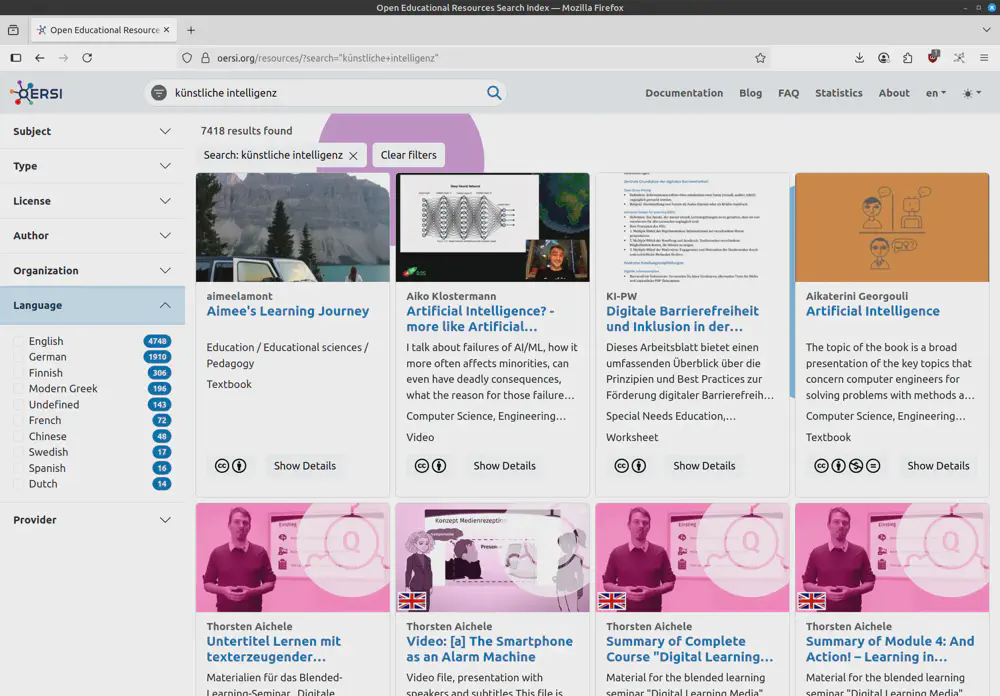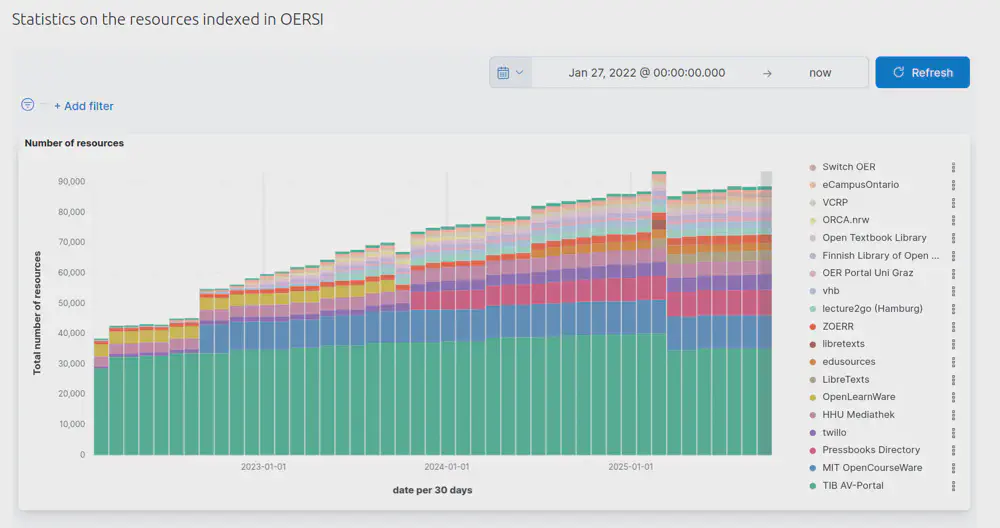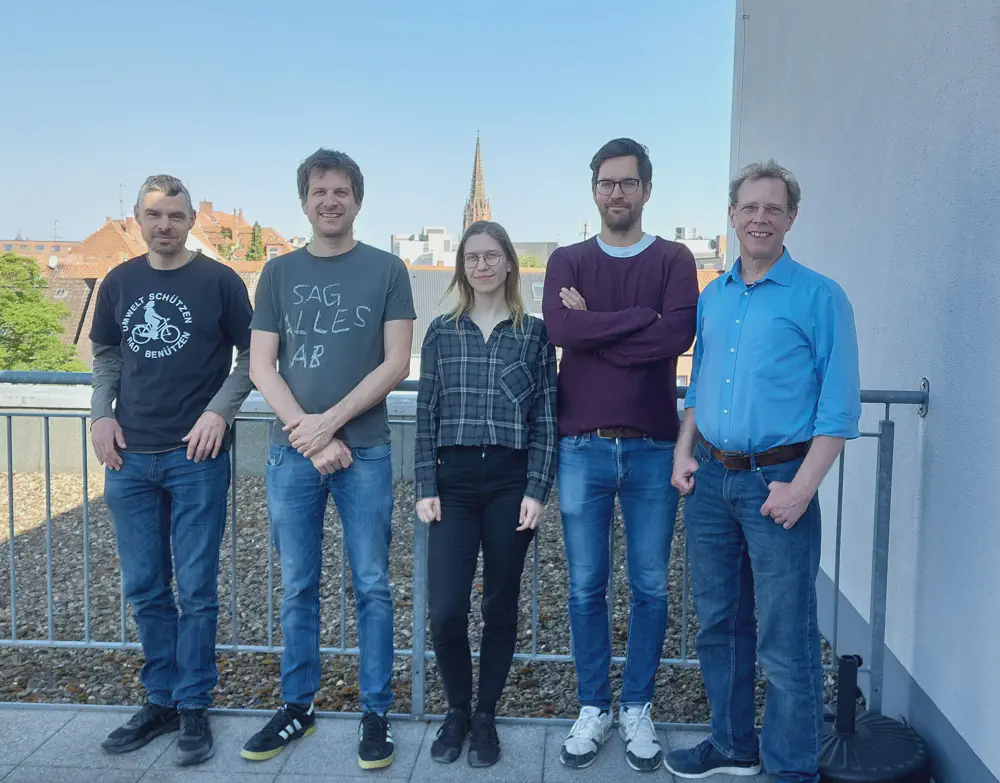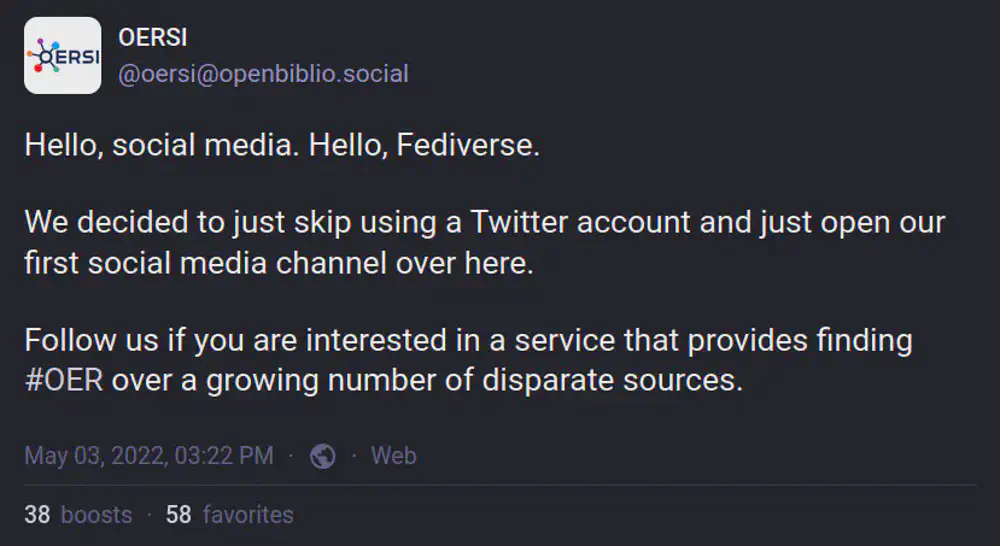OERSI Anniversary 🎉 – Five years of open infrastructure for OER discovery
We are proud to celebrate the fifth anniversary of OERSI, the search index for open educational resources in higher education. For the past five years, the OERSI team has been collecting metadata from various OER collections on the web, providing a consistent user interface and API for querying the metadata. Starting with ten providers in 2020, the search index now incorporates metadata from 45 collections, making over 90,000 educational resources, most of which are published under an open licence, discoverable with a single search.
To mark our fifth anniversary, we redesigned the OERSI website in May 2025 with an improved user interface, better documentation, and a new blog to track our development.

The beginning
The project was initiated in January 2020 at a workshop in Düsseldorf with representatives from different German federal states. Adressing a situation where OER have been published in a number of different repositories but weren’t discoverable via single search service, Lower Saxony and North Rhine-Westphalia agreed that the development of an OER search index would be desirable and worthy of funding.
In the summer of 2020, our team — comprising individuals from the TIB (German National Library of Science and Technology) and the hbz (North Rhine-Westphalian Library Service Centre) — launched a public beta service. We happily transitioned it to a production service in April 2021.
From .de to .org
Against this background, it does not surprise that OERSI started with a focus on Germany and German-speaking OER. However, as degree programmes have become increasingly internationalised and the demand for multilingual learning materials has grown, we have started to include collections of OER in English and other languages. In April 2022, we finally switched OERSI’s domain from oersi.de to oersi.org to reflect this new international approach. Since then, we have also provided a multilingual user interface and search function.

Some statistics
The statistics pages show the development of the OERSI in terms of the total number of indexed resources and the number of providers from January 2022 until now. We also currently provide statistics on the geolocations of OER providers.
The following screenshot illustrates the growth from less than 40,000 resources in 2022 to over 90,000 in 2025. It also illustrates the growth in the number of metadata providers we are harvesting.

For anyone who is interested in more details: Whenever we add a new collection to the index, we add a ‘provider profile’ to our blog. Currently indexed collections are marked as ‘Activated’, while those that were only harvested in the past are marked as ‘Deactivated’: https://oersi.org/pages/en/tags/provider/.
Openness pays off
The OERSI team consists of individuals who value not only Open Educational Resources, but also openness in general. We believe that openness is the best foundation on which to collaboratively develop and maintain software and infrastructure. We embrace free and open-source software, open access, open data and open standards, and we work at institutions that encourage open practices. Consequently, OERSI has been open from the outset with regard to various aspects.
Open code and transparent development
In line with the “public money, public code” theme, all OERSI code is available under the MIT licence. Tickets are collected and organised on an open Kanban board. We welcome collaboration. While the OERSI team has done most of the work so far, some Merge Requests have been opened by external collaborators, who have provided things like an ETL workflow to include a new metadata provider. If you are interested in contributing to OERSI, please get in touch.
The software behind OERSI, which is a generalised application for indexing metadata from distributed sources and providing a search interface and API, is available for others to reuse under the name SIDRE (Search Index for Distributed Repositories). Following the Infrastructure as Code (IaC) approach, we use Ansible scripts to install the service.
Open Standards
We use the ELK Stack for the OERSI backend and, early on, we had to develop a JSON-based data structure that supports different retrieval functions. As we wanted our metadata to be based on shared standards, we created a schema.org-based metadata profile. We thought that others might benefit from a shared specification on how to use schema.org to describe their OER with structured data. This would support interoperability between applications and facilitate the integration of new metadata in the long term. Consequently, we began working on the ‘Common Metadata Profile for Educational Resources’ (Allgemeines Metadatenprofil für Bildungsressourcen (AMB)), which has since then been developed into a key recommendation regarding metadata for German educational content.
For more information about the AMB, please refer to the slides and/or the recording of the presentation at SWIB24.
Open Social
Some time ago, OERSI joined the Fediverse — a distributed social web based on web standards — where we post short updates, take part in discussions about OER discovery and respond to enquiries. We chose the open Fediverse over closed commercial platforms like Twitter/X, which are increasingly characterized by the spread of disinformation, hate speech, and toxic communication.
Below our first fediverse post. From the start, we felt very welcome and comfortable in a bigger community of individuals who share our values in openess.
Indexed in OERSI = discoverable via multiple search UIs
Over the years, resources in OERSI can be discovered through more and more services. We provide an open search API and weekly updated dumps so that others can reuse OERSI metadata. To facilitate reuse in library systems, we even provide OERSI metadata as MARC21.
Different platforms make use of these possibilities, here are some examples:
- twillo.de developed a reusable OERSI-Search plugin for WordPress.
- BASE, a big search engine for scholarly internet resources includes most OERSI data.
- ORCA.nrw provides an OERSI-based search by reusing the Wordpress Plugin from twillo.de.
- The ComeIn project created many OER and ended in 2023. It added the whole collection’s metadata to OERSI so that it can effortlessly provide a search over the OERSI subset.
- OERSI metadata is also integrated in finc, an aggregated index used by many German libraries.
- Lots of academic libraries in North Rhine-Westphalia integrate OERSI metadata into their search interface (they can easily add it through the Alma library management system where OERSI can be activated as an additional collection offered on union catalog/network zone level).
As a result, people are not only driven to the educational resources that are indexed in OERSI via oersi.org but also via a lot of different other search interfaces. This means, when you include your open educational resources in OERSI, they will be discoverable in a lot of different search applications.
Move purposefully and build things
The OERSI core-team is working at institutions that are running and maintaining lots of digital infrastructure for researchers, students or university libraries. The service was originally developed using internal resources and without external funding. Over time, further expansion has been achieved through various third-party funded projects.1 However, from the beginning we have adopted a working mode that is not focused on quick wins during time-limited projects phases but on steady, if slow, progress. We are very confident that we also will be able to continue these developments over the next five years! 🥂

-
Internationalisation features were added within a project of the National Education Platform, transformation to the generalised Sidre software via the Open Source Developer Network, a joint project of Hochschule.digital Niedersachsen. ↩︎
